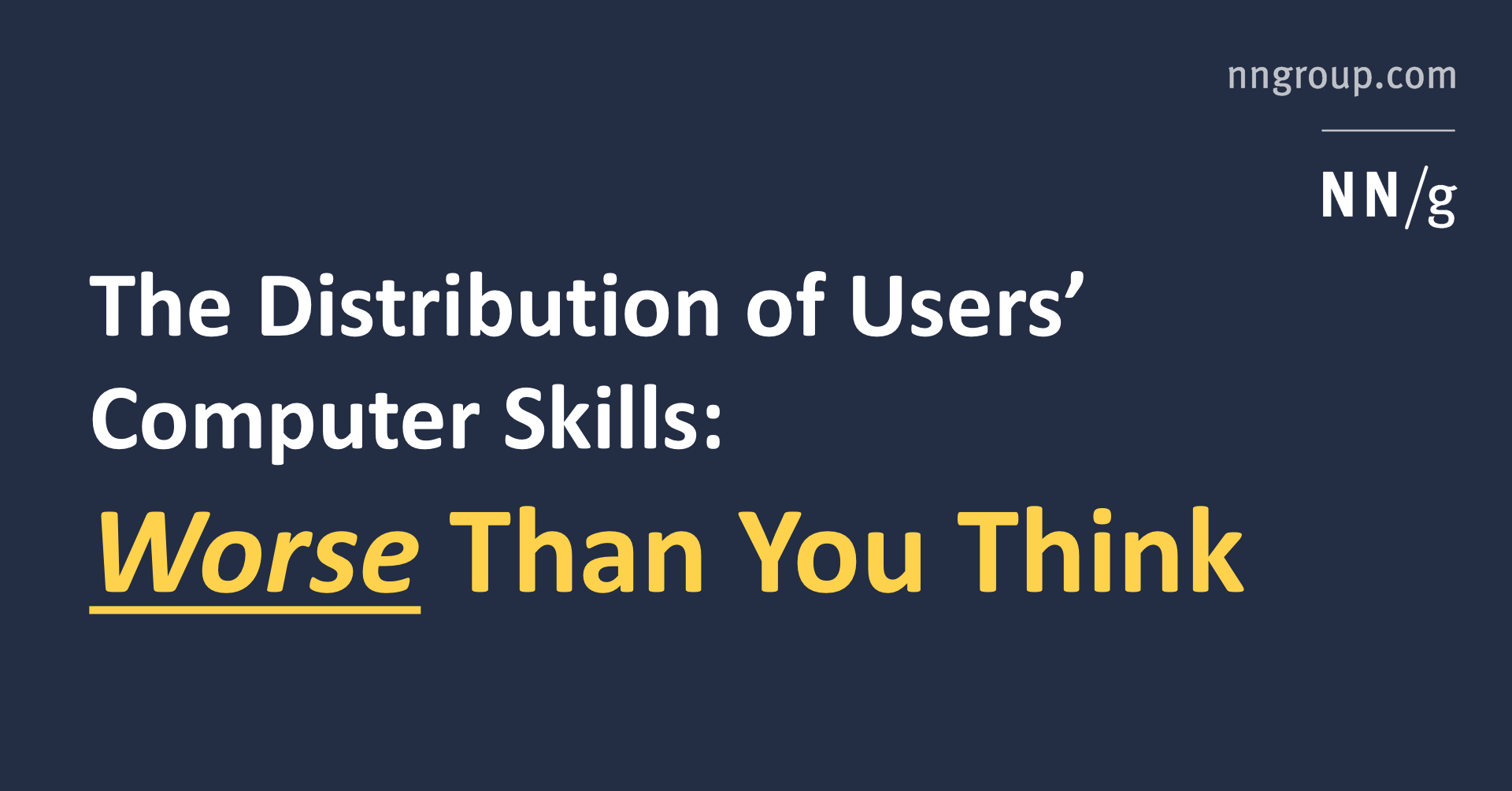As frustrating as this may be, it’s even more frustrating when I see exactly the same thing among PROFESSIONAL SOFTWARE DEVELOPERS!
directory structure and basic text editing are foreign concepts to them. If it’s not in their IDE, they really don’t understand it.
Also, 90% of them are hunt-and-peck two finger typists.
I’m honestly blown away by how many developers don’t even know the basics of git
They had one employer maybe who never used it?
Yeah, some companies are very slow to adapt. One company I worked for was still using SVN. It was a nightmare lol, and when they did finally migrate to git, some of my coworkers were completely lost.
But there’s also something to be said among developers I’ve worked with on hobbyist projects. Plenty of people who just shared files over and over, or just had it on Google drive or Dropbox
We hired a guy 2 years ago and his company was still using MS Virtual SourceSafe. Dudes, that was released in 1994 and the last update was 2005. Just crazy.
I started noticing this 10 years ago. To me, this isn’t some new phenomenon. However, it feels even worse now than it did back then.
The number one thing that makes me go JackieChanWTF.jpg is when people don’t even know how to navigate through directories.
It has always been this way. Part of my “age-driven degradation” is that I can see the same patterns repeating themselves often at odds with the age of the people in question. The average competency age always shift younger as any skilled profession does. I however am constantly having to show people that should have a newer skillset than me basic problem solving skills and somehow we can both read the same documentation and they not see the solution.
There was a post here a while back about how younger generations often don’t understand concepts like file system structures because concepts like that (which are still relevant in a lot of contexts) have been largely stripped out of modern user interfaces. If your primary computing device is a cell phone, a task like “make a nested directory structure and move this file to the deepest part of it” is a foreign concept.
I guess my point here is that I agree with yours about this being cyclical in a sense. I feel crippled on a cell phone, but I’m also in my comfort zone on a Linux terminal. Using web apps like MS Teams is often difficult for me because their UIs are not things I’m comfortable with. I don’t tend to like default layouts and also tend to use advanced features which are usually hidden away behind a few menus. Tools built to meet my needs specifically would largely not meet the needs of most users. A Level 1 user would probably have a better experience there than a Level 3 like me. It’s hard (maybe impossible) to do UX design that satisfies everyone.
Are the user levels an actual defined thing and are there more?
The article quotes extensively from the study about this and gives examples regarding what kinds of tasks qualify for those levels.
After actually reading the article I see they’re well-defined. Thanks for pointing me there ^^
Nielsen and Norman group know what’s up. I learned this at my first office job. Everyone thought I was a wizard hacker when I showed them inspect element. I got in trouble with my director who flagged IT Security when I showed my team lead an inspect element on some intranet page. I had changed a title to something else as a proposal and they had thought I had hacked their intranet and changed it myself. Triggered a whole security incident.
I thought everyone with a computer knew about this. I was wrong.
Lot’s of software is just shit/hard to use
That is the reason for degrading proficiency. Not, that the tools are bad but the attitude, they have to be easy to use.
That almost everything “just works” is nice as a consumer but it won’t make you troubleshoot and you will not gain technical expertise by using such devices.
I teach math to undergrads, and damn it’s sad. They don’t know how to send a PDF file from their phone to laptop, and upload it to Canvas. One guy ended up emailing it to me. They don’t even know what a folder/directory is.
Well, in his defense, I could save a file from 8 different applications and they end up in 8 different locations on my phone file system. You would think they would all go to Documents or Downloads…nope. apps dont let you pick locations, and if they do, you don’t get to pick anywhere you want
They don’t know how to send a PDF file from their phone to laptop
With USB cable? Because outside of that it gets complicated and/or vendor-specific quickly.
That’s what KDEconnect is for. Oddly enough I think it even works in windows nowadays.
Managing digital information today is a horrible mess of silos and big business driven incompatibilities. It often drives people to use PDFs, as there is nothing appropriate. Blame the software/businesses, not the victims/users.
I mostly agree with you. But it only works because users give in. They deserve some of the blame.
Why would they need to know what a folder/directory is? It’s a remnant from meat space and was replaced by tagging and is being replaced by LLM search/AI.
Why wouldn’t they be able to upload it directly to canvas?
I really empathize with people that didn’t have to figure out how to rip a CD at 2x speed or take a class on card catalog systems. They skipped a lot of critical problem solving learning opportunities.
Directory hierarchies are absolutely not a remnant from meatspace. The world “folder” is, but IRL folders are a totally different beast because they’re not nestable. Tags and searching serve useful purposes but they don’t replace directory trees.
Folders are absolutely nestable.
The problem with virtual folders is you can’t have one document in multiple folders without causing chaos because of how limiting that hierarchy is. This is why tagging is better.
Tell me you’ve never used a filing cabinet…
For about a year I worked in a filing room. I saw a decent amount of filing methods.
I am by no means top at anything I do with a computer, but I do find it said that I tend to know more than almost anyone I interact with in real life when it comes to using computers.
For the most part the way I became proficient with a computer has come down to reading comprehension. I would like to see studies showing the overlap of computer proficiency, and reading comprehension.
In my experience, it’s not just a lack of reading comprehension, but often some combination of an utter lack of curiosity, laziness and defeatism. Many other things, like video games, have escaped the realm of being reserved only for nerds and gone mainstream, yet computers remain something people just constantly assume are hopelessly complicated.
I know for a fact my mother-in-law can read just fine, as she spends most of her day reading novels and will gladly spend the rest of it telling me about them if I happen to be there. Yet when it comes to her cell phone, if there’s any issue at all, she just shuts down. She would just rather not be able to access her online banking in the Citi bank app for weeks or months at a time, until one of us goes and updates it for her, rather than reading the banner that says “The version of this app is too old, please click here to update and continue using it.” and clicking the damn button. If anyone points this out to her, though, she just gets worked up in a huff and tells us “I’m too old to understand these things, you can figure it out because you’re still young.” She will eventually figure these things out and do them for herself if nobody does it for her for a while, but her default for any problem with her phone is to throw her hands up and declare it a lost cause first. I’ve seen a lot of people have the same sort of reactions, both young and old. No “Hey, let’s just see what it says,” just straight to deciding it’s impossible, so they don’t even bother to check what’s going on.
I know too many people like that and I hate them
“I’m no expert so I will dismiss this dialog without reading it” - “it gives me error but because I’m not expert I’m not going to read it” - “it says something but you need to come here to read it - no, I’m unable to read it because I’m not expert”
And at the same time believe in a million conspiracy theories in fields that they definitively are not experts in
It’s the retarded UIs, I think. I function the same way when having to use Windows, Android, typical applications and sites. It’s an undertaking to use any of them to some end.
Now why do these people give up and offload it to us “sufficiently young” - they think these UIs are retarded for them, but work for us. Like “you wanted such things, you help me with them”.
And they can’t accept that such things are aimed at them and not us.
You can critique UI design without using an ableist slur
OK
Dude, you’re on Lemmy. That means you’re probably in the top 1% of people with computer skills.
I have been considering this for awhile. I’m also assuming this is the largest reason why lemmy’s growth hasn’t been what we all wanted lool
Not gonna lie, I love listening to the smart comments, I’m not THAT smart. And thanks to reddit being shit (comments suck) I refound lemmy
I’ve done support for sysadmins for almost a decade, and the ones that are the biggest pain in the ass to deal with are the ones who can’t or won’t read the error message and think a little about it. And my kids’ friends all have the same problem: They don’t read what’s on screen and if they do they make no attempt to understand it.
This is why the humanities are important. All those times you have to explain why the curtains are blue is practice for reading other things and determining meaning.
Yeah the biggest problem for people who can’t use a computer always seems to be that they just won’t ever read what it says on the screen. The solution to problems is often very obvious if you just actually read error messages or tooltips or anything
From the article it does seem that the failure of ability isn’t strictly related to computers per SE, but to an over all inability to think about the word problems given in an abstract and mathematically coherent way. They seemed to ask participants to solve what are essentially database query, reading comprehension, critical thinking, and logic problems in the context of an email suite. Word problems can be hard for anyone that hasn’t studied and practiced how to decipher them. It’s just that using a computer kind of forces one to confront those gaps in what should be a fundamental part of highschool education. Math and science classes aren’t just solving problems by wrote memorization or memorizing the periodic table, they are about problem solving. Lots of people fall through the gaps and don’t get that one special teacher who understood this.
Same shit here. Now I know I have ADHD, back then I didn’t. I just couldn’t concentrate on any complete task. And still one day I started my Gentoo install and completed it simply by reading the handbook and the error messages etc. Ended up using Slackware after that, via reading too.
It’s mind-boggling that people who can concentrate on reading pages and pages of text with their content won’t read what’s put under their nose.
The worst part, is a good chunk of those people don’t retain or comprehend what they read either.
That’s another thing.
It is upsetting, yes, when a normie says “ha, you don’t even know in which year yadda yadda A has happened”, but then they can’t answer what is the meaning of that knowledge for them, how is it connected to other events and which, what is the value they’d extract from it, etc.
But it’s understandable that people with good memory get comfortable with using it instead of thinking. Sometimes thinking much faster is too an ADHD bonus, it’s not like I deserved it somehow before being born.
But getting back to computers - it’s rather that in their lives text is apparently mostly meaningless, and they expect that from the error messages. So they seemingly don’t read instructions or scientific\engineering\hobbyist literature. They don’t make things and find flaws in them. They don’t have that thing in their souls which in Ancient Greece was called “metis”.
From the tasks described, it seems to me they were not measuring ‘Computer Skills’ as reasoning, patience, tenacity - people could have similar issues with similar tasks involving a pile of papers.
I’ve been reading the book “A Small Matter of Programming” which discusses a bit end users relationships with computers.
I think people who are into computers get surprised to know most people just don’t care about how computers work and they shouldn’t have to. They want software that is easy to use and allows them to complete their task. Ex: a spreadsheet is an incredibly powerful software that hides anything about how computers work but still allow users to create multiple different “apps” by effectively programming.
This is one reason Apple is so successful and a lot of tech users don’t understand it. Apple creates “abstractions” so that end users don’t have to deal with low level details — something they don’t want to. They want to see the machine as a black box that just provides them some service easily and smoothly.
Most of the “decaying” tech skills people say are actually stuff people don’t need to know nowadays. Everything is an abstraction anyway, and most people tinkering with desktop computers aren’t aware of how the graphics software is rendering the screen, for example.
The problem is the software isn’t making it simpler to operate just by abstraction, much of it is by subtraction.
It’s not turning two buttons with individual functions into one, it’s removing a button all together, even for the people that knew how to use it.
The problem with the abstraction is, the more you rely on technology to replace certain skills, the more dependant on it you get, and the tech industry is getting less dependable and increasingly predatory when it comes to the users that are now dependent on them. That dependence also leads to more market entrenchment.
For example, if you don’t know how to manage files, you are trapped forever with iCloud or OneDrive until they create easy ways to transfer everything seamlessly between clouds (and they won’t). That’s bad for users and for the industry overall.
Basically, without the skills, you have to trust the tech companies to guide you by one hand and not stab you with the other, and they are increasingly unworthy of that trust.
I built my entire cloud storage strategy around Google drive because it had very simple integration with my previous seed box provider. Like, I could run Plex from the cloud through them directly off of my Google drive and then mirror that to local storage.
Super slick and easily usable setup. In a push to completely de-google my life the past 2 years I had to figure out an effective migration strategy off of that stack.
It was a total pain in the ass. Not to mention moving the rest of the people on my family plan off of Google as well. The majority of them are fairly tech savvy and even with that in mind we struggled.
I am now 100% self-hosted and learned a shit ton about docker along the way but, I couldn’t imagine trying to do the same thing with a group of entry level users.
I believe the most computer proficient people were born between 1975 and 1995. Before that and they were too old to figure it out without a lot of effort. After that they grew up with touch screens and it’s all just magic. Right in the middle we were able to grow along with advancements in computing.
I was teaching a class with mostly students born after 2000. One of them had never used a computer with a keyboard and mouse. Never used folders and files. Kind of blew me away.
I saw middle school students preferring to type a report on a fucking touchscreen rather than a pc with keyboard “because in this way is faster”. Then for some reason they share a fucking screenshot of the document instead of just attaching that to the email
The screenshot thing is PAINFUL and way too common by management in particular
I have seen worse. Normie’s around me use their phone to capture photo of the laptop screen and send the low pixel photo with less than half part in it including the actual document.
When I ask for a screenshot I get a Word document with a picture in it about 10% of the time.
I would put it up to 1999.
But the returns of 1995-1999 are very small indeed.:(
EDIT: Welp, I guess I just proved someone else’s point.
?
Btw the “>” at the beginning starts a quote.
To prevent that put a\before something like a*or. Like this:\\>. Hope I could help you :)That is exactly what happened. I was trying to jokingly express anger at seeing my birth year being correlated with being tech-illiterate, so I typed a ‘>:(’ emoji, not realizing I needed an escape-character to avoid it looking like quote.
Hope you get the same laugh out of it as I did lol
No worries, figured as much :D
Wow, this is bleak.
I read somewhere (I think the deloitte tech survey from a few years ago) that many people have replaced their pc with smartphones and use their phone as their primary tech device. Would be interesting to see if any of these low-level skill folks are actually high (or higher) on mobile skills.
Would be interesting to see if any of these low-level skill folks are actually high (or higher) on mobile skills.
“Mobile skills” are likely still lower skill. Tablets and phones are mostly content consumption devices instead of content creation (photos/videos excluded). Does anyone do serious software development on a phone? How often are mobile users writing papers or prose using only their touchscreen? How many people are doing complicated video edit on an iPhone? Can those tasks be done on a table/phone? Sure, but I don’t think its common.
The reason this is a problem is that it means there is a barrier between deeper computer skills and the devices/environment that people are using daily. The reason many of us became computer savvy on a desktop wasn’t because we wanted to, its because we had to to get the game running we wanted or we had to write the paper we were required to. So being familiar with other uses on a computer, it is only a very mild extension to writing a script if the need arises. The only “new” or “foreign” part is the script, not the environment or interaction of where you’re creating it.
With a tablet/phone as your primary device it means learning not just scripting, but learning all the skills necessary to use a computer. Its a high barrier.
However with their examples you don’t need to write a script, you can solve them that way but you really don’t need to for these examples. This is some basic search refinement skills (Outlook would even help you build this unlike say a Google search with refinement filters) and either a small spreadsheet or a calculator app to max out at their level 3.
Scripting this I would put at a level 4, but I would be interested where the authors of the paper would fit that in as its their research and what sort of percentage would fit into that skill set.
I think scripting is certainly a level 4 activity, since to even get started solving the problem you would need to navigate an IDE and have basic knowledge of a scripting language. Most people wouldn’t even know where to start.
What do you think all those “hacker” scarecrow movies and alarmist articles and laws were aimed at and caused by?
Modern computers allow one person to do the monthly work of the Soviet Genplan on their home machine in a day if they are smart, in a month if they are average, and Soviet Genplan employed more than one person.
Together with the Internet they make power over masses a much less certain thing.
Except if you poison both, you can not just neuter, but invert the effects.
We still have more and less powerful people in our world.
What I mean is that I don’t think it’s a coincidence that “user-friendly” computing, bloating of the Web and rise of authoritarianism happened with the same intensiveness in the same ~20 years.
From what I recall, particularly the younger generations that exclusively use mobile devices (though of course this is not limited to them) actually have terrible tech literacy across the board, primarily related to spending all of their time in apps that basically spoon-feed functionality in a closed ecosystem. In particular, these groups are particularly vulnerable to very basic scams and phishing attacks.
They’re also market-locked. If you have so little ability to function outside of an app, you become incredibly resistant to moving from one to another unless it’s identical, and you’re incapable of using marginally more complex things.
It also gives immense market control to the app stores, have been allowed to exist mostly unregulated. Thankfully that might be changing.
When everyone must be spoon-fed, that makes the only company selling the spoons insanely wealthy and powerful.
It’s also going to have a degrading effect on popular software overtime. When the only financially viable thing is to make apps for the masses, you are not incentivized to make something extraordinary.
Compare Apple Music to iTunes, just on a software level. Just on the sheet number of things you can do with iTunes, all the nobs and levers, all the abilities it grants a user willing to use it to its max potential. At some point, it no longer became viable to create an excellent piece of software, because most people have no skills or patience or desire to use it.
So you start making things that don’t empower the user, instead you make things that treat them like children, and your products get stupid.
I work in tech at a credit union and we’ve hit a weird full circle point where the new folks entering the job market need a lot of training on using a computer for this reason. It’s been very bizarre being back at a point where I have to explain things like how to right click because a lot of people have grown up only using phone/tablets.
I’m in IT. There was a time when I was sure that the younger generations would be eclipsing my technical skills. I knew where I came from, and what I was exposed to and assumed that the younger generations would have everything I had, and even MORE technical exposure because of the continuing falling cost of technology. For about a decade that was true, and then it plateaued and then, as you experienced, I saw the younger generations regressing in technology skills.
Think back to when we were kids. Remember that period of time when not everyone owned a computer? Or if they owned one, it wasn’t necessarily used much? There were people that were “computer people”, who used computers daily for entertainment or tinkering or socializing (once the consumer internet took off) and there were people that didn’t need or care about them outside of their workstation at the office.
Even after the Internet, this dynamic was there. You had the enthusiasts who really spent time on their computers and got to using them well, and you had people that simply owned them and checked email or browsed the Internet from time to time.
The enthusiast/non-enthusiast dynamic has always existed. There’s always a gap. It just takes different shapes.
Now, everyone owns a smartphone and uses for everything. They’re critical to life, enthusiast or no. That’s the baseline now. The gap is entirely in skill and usage, not so much hardware or time spent on it.
Before computers and the internet, no tech skill was needed to interact with our modern world.
After them, and for a few decades, the skill floor rose. You needed to learn technology to participate in the modern world.
Now technology has reached a point where the skill floor has dropped down to where it was before.
The mistake we made was in thinking that our generation learning to use technology was happening because they wanted to. It was incidental. Skill with technology comes from desire to obtain it, not simply using technology a lot.
The mistake we made was in thinking that our generation learning to use technology was happening because they wanted to. It was incidental. Skill with technology comes from desire to obtain it, not simply using technology a lot.
We learned the technology to accomplish specific mundane goals, and along the way learned the inner workings of the technology which became applicable to the working world. Now, to accomplish those same rather mundane tasks there is very little to learn, and very little ancillary learning benefit derived from doing those mundane things.
There was a time when I was actually worried about job security due to an overabundance of young people wanting to enter the field. Nowadays, not so much.
On the other hand, I’m instead now worrying that younger generations might become even less able to understand the importance of digital rights if they don’t even understand the basics of the technology.

















